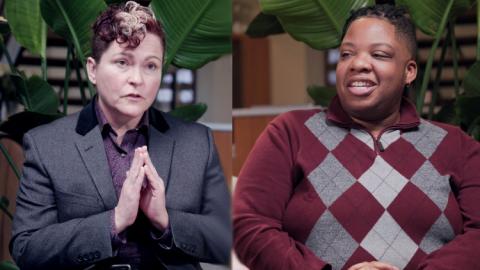800-800-0350

Activist Scott Keoni Shigeoka, who identifies as queer and spiritual, went on a yearlong (pre-pandemic) road trip across the United States to understand how we could bridge social and political divides.
While in Minneapolis last year, Shigeoka brought together community members and leaders from the LGBTQ+ and faith communities for honest and open conversations with each other. They laughed, cried, and shared stories about their lives, as seen in the video below. We also caught up with Shigeoka to talk further about reconciling queer identity with organized religion; read the interview below.
The Advocate: Why did you create this video?
Shigeoka: I learned that so much of what LGBTQ+ folks are fighting for right now demands that we do this in solidarity with others outside of our community. These allies are a growing base of progressive support that exists across our country. I learned from OutFront's executive director Monica Meyer, who is featured in the video, that successful campaigns to protect the rights of same-sex couples in Minnesota have historically engaged with faith-based communities. This makes sense because Minnesota is a very religious state, with an overwhelming majority identifying as Christians (some polls show as much as 75 percent of the state). In the Twin Cities, faith communities are as diverse as its people with folks identifying as Muslim, Jewish and Sikh, among countless other religions too.
As we think about ways to drive social change, it's important for us to engage in a healthy, open and productive dialogue with those outside of our community. We have an opportunity to continue to mobilize the vast number of people in the religious community who are already in support of equity and rights for LGBTQ+ people. Many advocacy organizations are already doing this work, partnering with faith-based institutions on issues such as banning conversion therapy, updating employment discrimination law to include LGBTQ+ workers, and ending the violence against trans people—which disproportionately impacts trans women of color.
This video is a rallying call for the general public to join this effort of bridging LGBTQ+ and faith divides in our country. To walk the talk, this video was co-produced by a friend who is a cis straight man, Jon Reynolds. He lives in Minneapolis and attended the Christian college Bethel University. I thought it was important to not just talk about bridging, but to do it ourselves too.
What's your "spiritual autobiography"?
The first time I learned about the word "spiritual injury" was in a conversation with my dear friend Eddie Gonzalez, who works at the Civil Conversations Project at On Being (a podcast produced in a studio in Minneapolis, where we shot the film). As a gay kid growing up, I was immersed in religious narratives that marginalized LGBTQ+ people. It made me feel like there was something wrong with being gay. Even though I felt deeply connected to spirituality, I was told by people and this broader narrative that I couldn't be queer and spiritual. These religious narratives also impacted my mental health. I entered a spiral of shame that transmuted into self-hatred. It's a story that many of us in the LGBTQ+ community can relate to.
Overtime, I learned that not all Christians are the same. I remember the first time I saw a Pride flag hanging in front of a friend's church, which is very different from the anti-LGBTQ+ narratives I heard growing up. Throughout my adult life, I've met thousands of people who are religious yet accept, celebrate and include the LGBTQ+ community. They organize with us, they march with us, and they fight with us. I also learned that some religious people are LGBTQ+ themselves—even members of clergy or leadership.
These interactions helped me overcome my 'spiritual injury', which was a barrier that prevented me from connecting fully to my own spirituality. It also countered the stereotypes I had about religious people, introducing more nuance to a group identity I once viewed as monolithic and anti-LGBTQ+.
Over time, I learned that I could be both queer and spiritual. The process itself has been healing to my own spiritual injury.
What's next for you?
I hope to bring these kinds of stories and opportunities for dialogue to different spaces, such as Christian colleges. I'd like to bridge the LGBTQ+ and Faith divide.
Overall, the work of bridging differences is about bringing more people along the journey toward justice and equality for all. It has become a life purpose for me. Creating solidarity is an important aspect of social change across all issues, not just in service of the LGBTQ+ community. For example, the LGBTQ+ community can march, enlist and organize in solidarity with Black Lives Matter—just as the religious community can work toward equality alongside the LGBTQ+ community.
Read the article and view the video on Advocate's site.